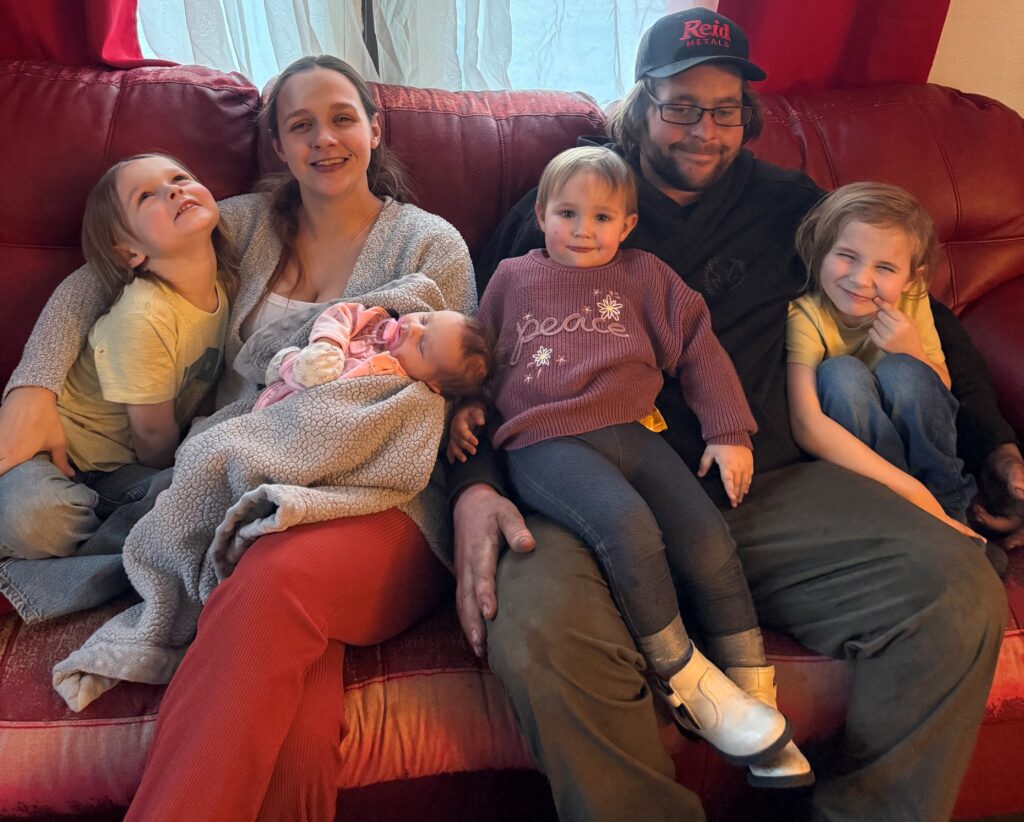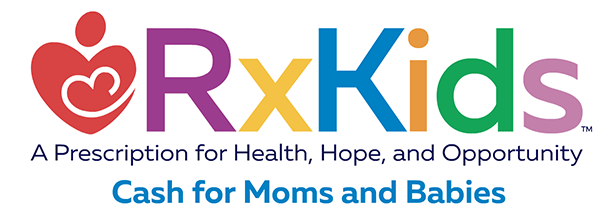
Haley Stewart has already witnessed Rx Kids making a positive impact for families like hers in the eastern Upper Peninsula of Michigan.
Like many rural areas, the eastern Upper Peninsula in Michigan has many challenges that families raising children must manage to meet their basic needs.
Access to health care and medical facilities is often scarce, making transportation to appointments more expensive. Local economies are often unpredictable, as jobs can be seasonal or based on the times of year when tourism is busiest. Even small errands, like going to get groceries, can be complicated by how far away some families must travel to get to stores, making everyday tasks like childcare and reliable transportation more difficult.
Haley Stewart, a mom of four in Sault Ste. Marie has tried to balance these many parenting responsibilities. She and her husband recently welcomed their fourth child, Juliana, this month. Juliana’s birth coincided with the expansion of Rx Kids into Luce, Mackinac, Alger, Schoolcraft, and Chippewa counties in the eastern Upper Peninsula, and it provided immediate help to Stewart’s family.
“It made it so that my husband was actually able to take a week off of work after Juliana was born,” Stewart said. “He was able to get me to appointments and take my son to school and we didn’t have to worry about missing any bills from him taking time off from work.”
Stewart noted that her car needed to be fixed and had broken down, and the initial $1,500 cash prescription from Rx Kids helped them get the repairs it needed before their new baby arrived.
Stewart said the financial support, and the flexibility that comes along with it, from Rx Kids is crucial. The economy in her area relies heavily on seasonal tourism, with businesses in Sault Ste. Marie booming in the summer months due to attractions like the Soo Locks and the collection of shops locals call “Fudgy Lane.” But when the tourists leave, many families experience income fluctuations, making it difficult to budget for necessities year-round.
She has long been an advocate for spreading awareness of programs that can help families in her community. One of the aspects of Rx Kids that she finds most remarkable is its universal eligibility—there are no income restrictions, ensuring that every family with a newborn can benefit from the initial $1,500 payment and the $500 monthly prescription for the first six months of a newborn’s life.
Beyond financial relief, the program also helps ease some of the structural challenges unique to rural communities. One major issue Haley pointed out is the lack of a local Neonatal Intensive Care Unit (NICU). If a baby is born prematurely or with complications, families must travel three hours to the nearest NICU, which means additional expenses for lodging and transportation.
“This program has already been helpful to some of the people I know that have gone into preterm labor,” Stewart said. “They aren’t stressed about how they’re going to pay for a hotel when they get over to their child.”
Professor Luke Shaefer, co-director of Rx Kids and director of Poverty Solutions at the University of Michigan, noted the critical role of cash prescriptions in addressing needs such as housing, transportation, food, and utilities.
“Rural families often have distinct challenges and barriers, from fewer job opportunities to limited access to essential services like healthcare and childcare,” Shaefer said. “Programs like Rx Kids provide families with the flexibility to meet their most urgent needs—whether that’s affording gas for a long drive to the nearest doctor or covering rent during a slow work season. Direct cash support is one of the most effective ways to reduce financial stress and improve long-term outcomes for children.”
Mona Hanna, pediatrician, director of Rx Kids, and Michigan State University College of Human Medicine associate dean of public health, emphasized how vital this support is for families, particularly in rural areas.
“We know that Rx Kids moms are better able to afford basic necessities like groceries and diapers, and their babies have better access to the health care they need at the most critical stage of their development,” Dr. Mona said. “Rx Kids provides stability and peace of mind during one of the most crucial periods of a child’s life. As the program expands into more communities, families like Haley’s will continue to see the tangible benefits of this investment in our youngest residents.”
That stability that the program provides allows parents like Stewart to focus on what is vital early in a child’s life – focusing solely on the needs of the new baby and family.
“Some of my favorite parts of being a mom are just being able to actually spend the time with my kids rather than having to go to work all the time,” she said. “Even though they’re rambunctious and crazy 90 percent of the time, just seeing how far they come growing from just little infants is one of my favorite things.”
